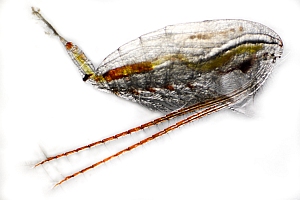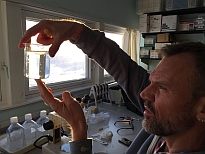Scientist Of The Month - February


This month’s GEM scientist of the month Torkel Gissel Nielsen has been working for the MarineBasis program in Disko Bay off Qeqertarsuaq since 2018. Through monitoring of physical, chemical and biological parameters he studies the effects of climate change on the marine ecosystem, aiming at a better understanding on how the marine pelagic ecosystem cope with climate change, e.g. warmer water and declining sea Ice. Recently his group is also investigated the impact of additional anthropogenic stressors such as oil and microplastics.
For Torkel, the Arctic passion started as far back as 1984, when he participated in the course Arctic Biology at Copenhagen University and spent 3 weeks at Arctic station in Qeqertarsuaq on Disko. The nature and the people living in the close connection with the marine system immediately struck him. He met Benni Hansen who shared his fascination of Greenland, and together they planned the first scientific campaign in June 1992. They investigated the pelagic food web of the Disko bay, and hence forming the baseline for his future Arctic research career.
Since 1992 major changes have happened in the Disko bay. Sea ice is shrinking and thinning, the open water period is becoming longer and major changes have happened at the base of the food web. The large lipid rich/fat Calanus copepods are responsible for the essential lipid rich diet of the higher tropic levels, including fish, sea birds, and marine mammals. During the last three decades, the composition of the Calanus community has totally changed from dominance of the large fat species C. hyperboreus and C. glacialis to the smaller and less lipid rich Atlantic species C. finmarchicus. This can have a dramatic effect on the animals that feed on copepod, such as fish, birds and the iconic bowhead whale, which has the fat copepods as their main food source.
“Our cooperation with the Hunters in Qeqertarsuaq is essential because they can assist us when sampling from the ice or from their dinghies long before its possible with the research vessel for Arctic station ‘Porsild’. These sunny, calm and extremely cold days on the ice, sampling on the sea ice with the hunters in the early spring might be some of my most valued memories – it is just fantastic each time.”
As for most Arctic researchers, the tough climate imposes a big challenge for field work. Despite the low temperature, many of the important events in the marine food web happens very fast e.g. the spring phytoplankton bloom. A proper description and understanding of such key pulses of primary production demands high-resolution plankton sampling during the transition from sea ice cover to open water.
“Greenland is very dependent on marine products for their livelihood and export income and a lot of basic information on the function and production of the marine ecosystem is still lacking. It’s a bit of a puzzle that Denmark does not have an ice breaker making research in ice covered areas possible, but I really hope that will be granted in the future.”
On a national scale, Torkel thinks that Denmark should allocate much more money to support research in Arctic ecology and the impact of the changing climate on marine productivity. There is still a lot to do regarding monitoring and basic research regarding the impact of climate changes in the structure and production of the Arctic ecosystem. In Greenland, this knowledge is particularly needed because of the strong dependency on Marine products for the livelihood of the people and the economy of the country.